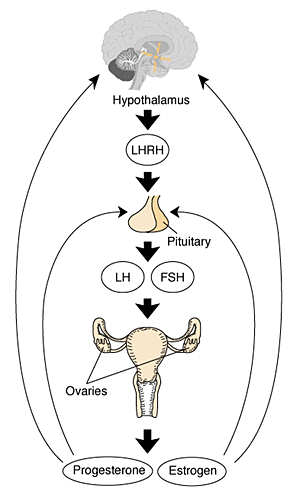GnRH stands for Gonadotrophin Releasing Hormone and an agonist is a drug that acts the same way as the body’s own hormone. The body normally makes GnRH in a small gland in the brain (the pituitary) and it is this hormone that stimulates the ovary to develop eggs and produce estrogen, leading to the normal menstrual cycle. If you give GnRH agonists, this floods the system and confuses the delicately controlled balance, leading to a complete block of egg development, estrogen production and menstrual cycle. It effectively makes you ‘menopausal’ for the time that you use the treatment and without the estrogen stimulation, endometriosis shrinks down and becomes inactive. There are several GnRH analogues available. Examples of GnRH agonists include: goserelin (Zoladex), nafarelin (Synarel), Buserelin (hormones and fibroidsSuprecur) and leuprorelin (Prostap). They are all either given by injection or nasal spray – tablet forms are not available.

Side effects of GnHR agonists include: menopausal symptoms such as thinning of the bones, hot flushes, dry vagina, headaches, depression, loss of libido and night sweats. These side effects can be relieved, by adding back estrogen and progesterone, which does not effect the benefit of treatment. This is known as Add-back therapy for Endometriosis. There is now evidence that the use of Add-back hormone replacement therapy (HRT) is effective in preventing the bone thinning and the unpleasant side effects of GnRH treatment.
Lupron is commonly prescribed for women undergoing fibroid treatment prior to surgery. The medication leads to a reduction in estrogen and effectively but temporarily shrinks the fibroids. This helps to resolve anemia, or a low blood count, prior to surgery reducing the risk of blood transfusion. Also, reducing the size of the fibroids prior to surgery many times will allow for a minimally invasive approach with laparoscopy or robotics. Since the treatment is limited to two months, almost all women will tolerate the nuisance side effects.
There is a lot of information about this drug on the internet, as well as lots of mention of it at Endometriosis chat groups. This drug is also used for other health problems in both men and women. It rarely can cause significant side effects. Remember, to most women with endometriosis and uterine leiomyoma, Lupron and other GnRH agonists provide amazing relief of symptoms of pain and bleeding allowing these women to return to functional lives.
